On 11 and 12 June, 2018 international experts gathered in Bizkaia to discuss responsible investment (ESG) at the II Biscay ESG Global Summit.
Testimonials 2017

Jose Ignacio Goirigolzarri
“Bankia is now embarking on a new stage of growth. And we have set up a strategic plan for this new stage that will be our roadmap for the coming three years.
Our goal is to be Spain’s best bank. We are therefore using a model that we call a responsible management model.
This management model must allow us to continue to be a leader among the main banks, in terms of efficiency, profitability and solvency.
We must ensure excellent service for all stakeholders in order for the financial results to be sustainable. Because sustainability is not only based on economic results, but also on how they are achieved. The whys are as important as the wherefores. Our responsible management model is based on four fundamental cornerstones: First-rate corporate government, satisfied customers, a committed team, and the contribution and commitment to society.
We are also going to delve further into the concept of responsible digitalisation, where privacy and appropriate management of our customers' data are our absolute benchmark.
This is the model to which we aspire”.

Carlota García-Mañas
What is the investment policy of an ethical investor?
Responsible investors are investors first and foremost, they have fiduciary duties to their beneficiaries and hence they are return seekers with standard investment objectives (target return and risk). What makes them responsible is that they embed responsible parameters in their investment strategy. This means that they will be elements considered in the investment that may not be part of traditional financial fundamentals (e.g. climate risk).
Ethical investors, have restrictions in their investments. As ethical investors we do so because it is right thing to do for us, not for risk return reasons. We accept there is a risk returns in the short-term could be impacted, but we do not see it negatively impacting returns in the longer-term.
How do you include non-financial parameters when investing?
For integration of non-financial factors we have a responsible investment framework (published policy here) and rating system. One has to be patient but consistent with managers on RI expectations and work with them on a journey in a way that suits their culture, investment approach and client base.
How do you track down the achievement of those non-financial targets?
In terms of tracking ESG characteristics we track and report a number of parameters, e.g. CO2 portfolio emissions, with input from external data providers. We will be looking to track impact further through the expansion of our Responsible Investment team into Impact Investment. Clearly we expect our impact managers to report in detail on the positive impacts achieved by their strategy. We encourage ESG reporting from all our managers. We also re-evaluate our managers’ ratings regularly and track their progress.
We also have internal systems that track each engagement and voting activity and the team works very closely on communicating the progress made with a particular company. This systems includes mechanisms of “escalation” by which we may take a stronger stance against a particular resolution at a company's AGM. We equally are in close communication with our managers and exchange views about our holdings.
Which problems have been the most difficult to overcome?
From an engagement perspective, making sure data is accurate and up-to-date is challenging. There are also the geographical barriers and general governance barriers by which an investor has difficulty accessing a dialogue with the Board.
With regard to responsible investment, we find there is less penetration of RI practices in alternatives and the US market, although this is beginning to change.
How do you unify the investment criteria for Christian investors? (because there might be very diverse approach among members of the Church of England).
We do not feel our role or objective is to unify Christian responsible investment practice. However, we work in close alignment with two other National Investing Bodies of the Church of England. We share the Ethical Investment Advisory Group that provides unified ethical guidelines for the three bodies. In practical terms, the teams meet and communicate regularly to align the elements of the investment that are common. But each, due to their legal and status requirements, has its own investment strategy.
We also work with other Christian investors through the Church investors Group. We feel that individual Christian institutions should find their own expression of RI that is right for them. What we try to do is to share our experience and the tools we use, and facilitate collaboration, so that it is clear that everyone can do something to reflect their values and priorities in the way they invest.
What is your roadmap for the next 5 years?
We aim to remain a responsible investor of reference and to drive progress in incorporating ESG across the investment industry and businesses. We pride ourselves of the professionalism of our staff, our thought leadership and will continue working on issues at the forefront of the responsible and ethical investment agenda. In particular, we are very active contributors and participants in engagement platforms promoting alignment with the Paris Agreement for Climate Change and have a number of public engagements through the IIGCC and Climate Action 100+.

Wim Van Hyfte
“In times of geopolitical and socio-economic uncertainty, it is time for the international investment community to write a new chapter in its history: one that takes a holistic view on the interplay between long-term development and the opportunities and risks that stem from sustainability, and one, too, that fully appreciates the socio-economic value of sustainability in investment decisions for all stakeholders”.
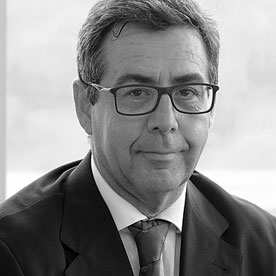
Jesús Martínez Pérez
"At Iberdrola, we conduct our operations with the focus on the expectations of our stakeholders in order to maximise the creation of sustainable value. The Iberdrola strategy embodies all this: our commitment to combating climate change and the close relationship with the communities where we operate are highly recognised and acclaimed aspects. In this regard, green funding, where we are world leaders at corporate level, is an additional part of our commitment to invest in renewable aspects and those that contribute to improving efficiency and, therefore, sustainable growth by cutting CO2 emissions.
Social Responsibility, or sustainability, or as it is known in the English Speaking world, the ESG approach, are the path to create a fairer and more sustainable world. The organisation of events such as the Biscay ESG Global Summit is essential to extend this view to all economic stakeholders and society as a whole. Iberdrola, in keeping with its sustainable growth strategy and commitment to combating climate change, is proud to partner whose initiatives".
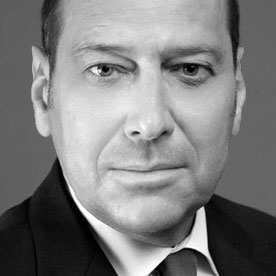
Thierry Bogaty
“The Summit successfully gathered international experts of the ESG ecosystem: leading financial professionals committed to responsible investment,and also public authorities which demonstrate a strong involvement about ESG questions”.
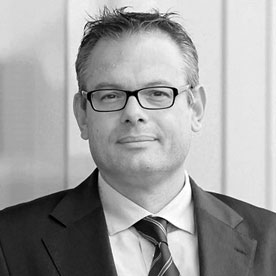
Sylvain Lambert
"The Biscay ESG Global Summit 2017 was a tremendous source of inspiration. The debates were very rich and animated by high level panellists. I was impressed by the quality and accuracy of the discussions. The summit was a great opportunity to meet inspiring people and to share our views on responsible finance."
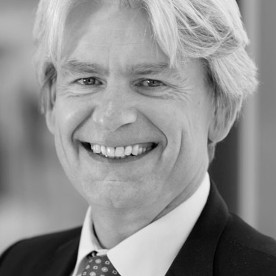
MARK LEWIS
What do you think about Bizkaia Provincial Council’s initiative to push for a new and sustainable way of doing finance?
I think the initiative is a very appropriate as it is very relevant and highly topical. We are witnessing a profound shift in the way that investors think about the sustainability of finances, but sustainable finances are not only important for investors, but for everyone. Ultimately, the use of ESG criteria is merely an effort to change the investment process and horizon. It is about looking at long-term horizons, beyond the short-sightedness of the markets. This way of long-term investing considers factors that are ignored in the typical short-term investment processes and they are key factors. I therefore believe that it is the right time for Bizkaia Provincial Council to drive the use of ESG criteria and sustainability in finance.
Something is changing in the financial world. But do ESG criteria have a future or is it a trend that will die in the near future?
There is no turning back on the use of ESG criteria when investing. I still remember that, in 2005, when the carbon market was in its infancy in Europe, a company in the energy sector told me that they had some other emissions initiative in place, but that they were not convinced that climate change was caused by humans and that they did not have much faith in the carbon market. And that was all about acid rain. But very important changes have taken place since then: the acid rain that was the talking point back then has disappeared as legislators have solved it by passing policies. And there is increasingly telling evidence that humans are the main cause of climate change. There are fewer and fewer people who challenge this evidence.
The vast majority of investors have accepted that fact as reality. And even the sceptics have accepted that governments around the world are prioritising combating climate change. Accordingly, those sceptical investors just have no other option than to accept the regulatory framework and we can consequently say that the battle has been won.
We can therefore say that this is no fad. Anybody who insists on ignoring those social, economic and regulatory signals about the importance of ESG criteria will not have a very long future in this industry. Just as Larry Fink, the CEO of Blackrock, the largest investment fund manager in the world, pointed out in his latest letter to the CEOs of the leading US companies: “if you do not take the environmental and social impact of your businesses into account, there will be no room for you in our portfolios".
How are we all doing in relation to the targets of the 2015 Paris Agreement?
Two different points need to be stressed here.
The first thing to be taken into account is that there is a discrepancy between the Paris Agreement between what is, on the one hand, the long-term target of keeping the increase in global average temperature to well below 2 ºC above pre-industrial levels, and, on the other hand, the level of ambition expressed by nearly all the national approaches in Paris. The problem is that the Paris Agreement sets the target, but does not provide the solution. Every five years, and as was to be expected, all countries have to review their level of ambition. In 2018, the countries are going to update their progress for the first time so that they can commit to new targets in 2023. The positive aspect is that governments are going to have greater flexibility in the future thanks to developments in technology. Thanks to technology, it will be increasingly easier for every politician to have a greater level of ambition when setting targets to combat climate change. You just have to look at how quickly offshore wind power technology is developing, thus dramatically cutting the cost of obtaining electricity, and that is the same with photovoltaics.
The second point that I initially mentioned lies in the need to speed up the level of ambition. COP24 in December 2018 in Katowice (Poland) will be the first opportunity to see that level of ambition. I do not believe that there will be significant breakthroughs, but it will be an important moment politically and symbolically speaking regarding the commitment of the countries. It will have to be seen, for example, if finally the USA still intends to leave the Paris Agreement, as it has recently sent out contradictory messages indicating that it might return to the agreement.
What would your message be for an ordinary citizen that does not believe in ESG or for those that do not give importance to environmental, social and governance issues?
The problem for a citizen is that the concept of climate change is very abstract. It needs to be specified. What we are going to see is that people are gradually becoming even more aware and that is going to force the legislators to respond. For example, very specific measures are being studied in the United Kingdom to cut the use of plastics and thus reduce the amount of plastic waste ending up in the oceans. In fact, the British government is committed to drastically cut plastic consumption by 2040.
However, the impact of climate change needs to be embodied in substantial and specific proof so that everybody can understand its importance.
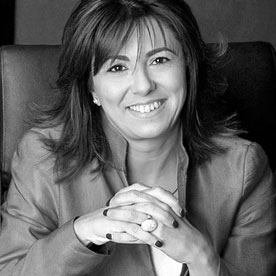
Rosa García
“ESG principles are part of Siemens Gamesa since the EGS early years (back in 2008), thanks to which we have been able to get those principles and the rationale behind embedded in our Business Strategy. We also take an active role in defining and updating the ESG parameters and the relevance of non financial information by taking part in the Global Reporting Initiative, as well as making our whole organization aware about the ESG relevance by linking monetary compensation to reaching certain ESG goals. All this job and commitment by Siemens Gamesa has been recognized by leading ESG global indexes like Dow Jones Sustainability Index, FTSE4GOOD, Ethibel, ECPI and Global Challenges Index. We thank public institutions, as it is the case for the Provincial Council of Biscay and the Biscay ESG Global Summit, for their active and leading role in this process, which requires the involvement of all relevant stakeholders, and which we believe is the basis of sustainable business model.”
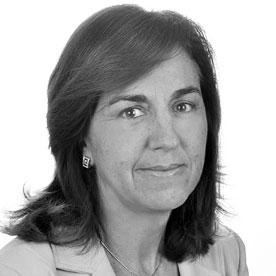
Mª Luz Castilla
"The Biscay ESG Global Summit 2017 was a first-rate international meeting on ESG, attended by top-tier institutional and financial representatives and from leading corporations in the field of ESG.
Changes in the institutional and regulatory environment have meant that non-financial or ESG (Environmental, Social and Governance) aspects are playing an increasingly greater role. The recent implementation of the Non-Financial Reporting Directive requires good governance, environmental and social information to be included in management reports. The Task Force for Climate Disclosure has recommended greater transparency about climate risks. The recent Action Plan of the European Commission is a significant impetus to sustainable finances.
In this context, ESG aspects are marking strategic decisions. The Biscay Global Summit is a inspiring benchmark to analyse latest trends, understand the ESG criteria of investors and analysts and get a close look at the latest corporate and institutional developments in ESG as explained by leading figures in the field. A meeting that should be in every top manager’s diary”.
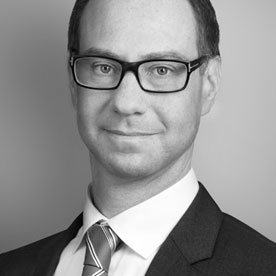
Steven Smit
“The conference succeeded in attracting a broad range of stakeholders (companies, investors, government) who learned more about how ESG can benefit their organizations. The conference was a good place for networking, learning and sharing ideas relating to sustainable investing. The conference had senior attendance and was very well organized.”

Josu Jon Imaz
“Sustainability must be a strategic target for companies, in addition to being a key aspect for many investors in our companies. Therefore, our ever-growing pursuit is for investors that invest using ESG criteria. This event is very useful to share experiences and involve everyone concerned about governance, social and environmental criteria: companies, the investment and financial community, institutions and stakeholders in general. We found the 2017 event to be a very positive experience”.

Jan Poser
What do you think about the Biscay Government´s initiative to push for a new and sustainable way of doing finance?
The Biscay Government is establishing itself as a reputed thought-leader among its peers of European regional administrations. It has clearly recognized that the economy will need to change the way we produce and consume. This decision will greatly benefit the region of Biscay by transforming it into a hub for future-oriented business models.
Why is it so necessary to use ESG criteria when investing?
An analysis is incomplete if it does not integrate ESG factors, because it neglects an important set of relevant data. Moreover, global sustainability trends will be determining the business place of tomorrow. Ignoring these trends will almost certainly lead to business failure. A thorough integration of material ESG factors into decision-making is the only way forward, be it on a public, on a company or on a financial markets level.
Does an investor have to give up return when investing using ESG criteria?
There are by now so many academic studies that show that ESG factors can even increase returns. The reason is obvious: ignoring important data does not help performance. I would conclude from this that ESG integration is a fiduciary duty for all investors towards the beneficiaries of the investments.
What would your message be for those investors that do not believe in ESG or for those that haven´t decided yet to invest using ESG criteria?
ESG will deepen and broaden your horizon. It will lead to more informed discussions on investments. It is a powerful tool to engage with your asset managers, your clients and beneficiaries and your investee companies. Even if it did not raise performance, it would raise the level of passion everywhere as portfolios will have a better profile in terms of controversies, carbon footprint and many other criteria for the sustainability of our planet.






